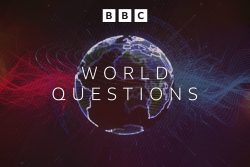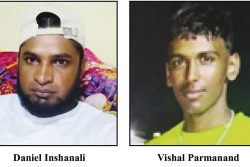Alissa Trotz is Editor of the In the Diaspora column.
Last week family and friends of the Barbadian writer George Lamming said farewell to him in a small, private ceremony. A long-time friend of Guyana, his last visit was in 2005 to mark the 25th anniversary of Walter Rodney’s assassination. Speaking at an art exhibition on the work of Eusi Kwayana, Lamming underlined the importance of courtesy as “a virtue that is worth cultivating because it is a spiritual shield, courtesy, how to be courteous, whatever the status, whoever the person, whatever the nature of the situation. Courtesy should never be suspended, because it is the most reliable protection against the virus, the terrible virus of intolerance.” I would later describe how for Lamming, courtesy was conceived not as politeness that did not change anything, but as a radical act that was also a process that modelled what we wanted to see, the kind of relation we wanted to bring into existence. For me, it seemed, Lamming was movingly referring “to the transformative power of gestures that challenge the status quo by crossing the divides that separate us.”
I returned to Lamming’s words in the last weeks, following the violent death of a young African-Guyanese man, Quindon Bacchus, at the hands of a police officer; the grieving family’s demands for justice (how many times have we been here before?); the public protests and gatherings to decry this latest example of police acting as judge, jury and executioner (covered over always by ‘the police version of events’); the criminal violence that took place at Mon Repos market in which vendors, Indo-Guyanese going about their daily business, were attacked, assaulted, robbed, their stalls and livelihoods destroyed; the indiscriminate police attack on Golden Grove residents, including children, later that day using teargas and pellets (a similar response was also visited upon Lindeners in July 2012, although then live rounds were also used, with three residents losing their lives), for which there has as yet been no proper accounting or apology or recompense. I thought of the absence of courtesy as well when I looked at so many, too many of the responses in the media to these horrific recent events.
We should be absolutely, categorically clear on a few things. Firstly, there can be no excuse or cover up for police brutality and deadly violence. Secondly, people have a constitutional right to take to the streets to protest in defence of their rights. Such a right should never be outlawed. Thirdly, there can never be an excuse or cover up for inter-community violence, whether it targets Mon Repos, Lusignan, or anywhere else.
Justice demands that we insist on all of these, all of us, all at once. We cannot and should not pick and choose. But sadly in Guyana today, this is exactly what we are seeing. Not the courtesy that Lamming invokes, but an echo chamber (manifested today in social media posts, letters to the press, commentaries and more) in which one’s story is the only ‘side’ that matters. Are we not tired of this? There is of course a history to this that has to do with how narrowly politics in Guyana is defined today; it is about the business of the state and political party and ‘who’ is in power. This is a dangerous game that only the very few can win, and the stakes are even higher today in the context of the untold wealth we are yet to see but are told will come from the discovery and extraction of oil.
It is an echo chamber that prevents us from listening to and learning from each other’s fears. Such conversations are difficult (especially when, if we are honest with each other, you are the face of someone else’s fear), but are really the only way we might make connections across our differences.
It is an echo chamber that misses what we already share. For instance, all the discussion about ethnic balance in the security forces seems to downplay the fact that the organisation of the forces of law and order today continue to behave not much differently than during colonial times when it comes to ordinary Guyanese. Neither African nor Indian Guyanese communities today feel protected. For all those commenting about ‘one side’ or ‘their side,’ that is a fact. Do we see that Indian-Guyanese at Mon Repos (like those assaulted in Berbice following the 2020 elections) have no confidence in the police protecting them from the racial violence that targeted them last week, at the same time that we also see that those outraged by the killing of Quindon Bacchus (less than a year after the police killing of Orin Boston in his home in Dartmouth) also have no confidence that police will ever be properly brought to account for the killing of African-Guyanese men? Do we really see, or care to see, the whole picture? Do we see that we need to see more? Not either/or, but both.
There are other things shared across these divisions. The deadly epidemic of gender-based violence – in the last two days alone we woke up to the news of the murders of 86 year old Agnes Dillon of Mon Repos and 29 year old Donalesa Parks of East Canje. We should be taking to the streets all day, every day, about this. The horrific traffic fatalities caused by drunk driving – Mothers in Black stands as one example of an effort to bring women together to challenge this lawlessness. The structural violence of poverty, in a country where Guyanese have been sold out by all political parties to multinational oil companies while the vast majority of people have to wait for crumbs and cash handouts – here we are starting to see some coming together across gender and race and political affiliation to challenge the outrageous agreements and outright breaking of laws in favour of big oil and gas. We need more, not less, of this.
It is not as if there have not been past efforts to sit with, listen to, organise alongside each other across race and party divides. In the early 1970s, The African Society for Cultural Relations with Independent Africa (ASCRIA) and The Indian Political Revolutionary Associates (IPRA) set up an informal joint commission to get communities to voice their fears and listen to each other. At the time, IPRA described the bottom house gatherings with the working people as “meeting Indians and Africans throughout the country, hearing their views on racial problems.”
In 2004, I wrote an article that appeared in the Caribbean journal Small Axe, which addressed the immediate aftermath of the 1997 and 2001 elections that was marked by violence, most of which targeted Indo-Guyanese. This was also a period in which young Black men in particular were being gunned down, in which again police and phantom squads were judge, jury and executioner. And like today, the echo chambers were such that sympathies, outrage and calls for justice were shaped by race and party loyalty. Few were stopping to listen to the pain of the other. Fourteen years ago, I interviewed an Indian-Guyanese man from Better Hope; in his late sixties, he concluded our conversation by saying: “I tell you, if the party politics are still playing so, I sorry for now generation, I sorry for the generation coming, I sorry for my grandchildren, because dis country will not get better. It will explode.”
Indeed.
As that 2004 article was in the process of being prepared for publication, I added a postscript to put on record what at the time seemed like a hopeful local development led by women. There is a video of late activist Andaiye speaking at a public meeting held on the streets of Georgetown, in front of a red banner inscribed with the words “Women say no to racial violence,” in which she addressed both the ongoing fragmentation of relations between Indian and African Guyanese communities but forcefully reminded everyone of all the other parts of our beautiful, fractured country that are excluded by this: “It is not okay to continue this war, and to use this war to continue ignoring the needs and demands of the Amerindian people.”
This week’s diaspora column closes with the postscript to that article, even though the movement did not materialise, because of what it promised. Because so many of those woman who came out in their numbers and signed the petition at the time are still with us. Hopefully some of them will read this. And because we owe it to the generations coming after us to break this vicious, abusive, politically bankrupt cycle. It stands as a possibility, as a reminder, as an urgent call, of who and what we can become as Guyanese:
“In January 2003 a small group of Guyanese women…called on all women to gather in the capital to begin a committed struggle to end the widespread violence. In a press release issued on January 29, 2003, the organizers explained the group’s purpose:
“It is no longer a choice . . . between violence and non-violence. It is either non-violence or non-existence.” Dr. Martin Luther King Jnr., in his last sermon
‘On Tuesday, January 28, more than 130 women of all races, classes and ages met at the Tower Hotel and decided to work to build a non-party movement of Guyanese women. We affirmed that what unites us is that as care givers, we refuse to accept abstract notions of justice which destroy children. We welcome the support of men who are in solidarity with our determination to organize autonomously against violence. We are organizing against all violence—and in this spirit, we have named ourselves simply Women Against Violence Everywhere (WAVE). Our work will be of different kinds. We want to work on the causes of violence and the effects of violence. We will use the media and public demonstrations to fight against the growing numb-ness to violence, including our own. We will be present and active not only in Georgetown, but everywhere. We will be in touch with families who are victims of violence of all kinds, and will try to respond to their requests for support, both emotional and practical. Whatever capacity we lack now, we will build.’
According to one newspaper, some four hundred women turned out at the first vigil held in Georgetown on 24 January, and some six hundred signatures were collected calling for an end to the killings, addressed to the political leadership, law enforcement, and the criminals. The international community—Guyanese from all walks of life, Caribbean academics and artistes—also signed the petition. In March and April, WAVE meetings produced a consensus to form a political committee, build networks across the country, gather information on violence in Guyana, and meet with other groups to discuss areas of mutual interest and cooperation. It is not clear if any of this work has begun. We have yet to see where WAVE will take us and whether it can withstand, confront, and surmount the bitter and as yet enduring legacy of Guyana’s past.”









